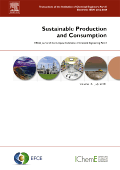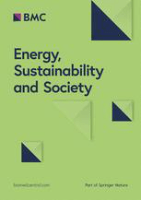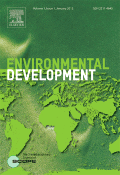
Discover Sustainability
Scope & Guideline
Fostering collaboration for a greener planet.
Introduction
Aims and Scopes
- Interdisciplinary Research on Sustainability:
The journal encourages submissions that explore sustainability from multiple disciplinary perspectives, including environmental science, economics, sociology, and technology. - Practical Applications and Case Studies:
Research that includes practical applications, case studies, and empirical investigations into sustainable practices is a core focus, providing real-world insights. - Policy Analysis and Recommendations:
Papers that analyze policy frameworks related to sustainability and provide actionable recommendations for governments and organizations are emphasized. - Technological Innovations for Sustainability:
The journal highlights research on technological advancements that facilitate sustainable practices, including renewable energy technologies, smart agriculture, and digital solutions. - Community Engagement and Social Dimensions:
Exploring the role of communities in sustainability efforts, including grassroots movements and social equity considerations, is a significant area of interest.
Trending and Emerging
- Climate Change Adaptation Strategies:
Research focusing on adaptation strategies to combat climate change is gaining traction, emphasizing the need for resilience in various sectors, particularly agriculture and urban planning. - Circular Economy Practices:
The integration of circular economy principles into various industries is increasingly prevalent, showcasing innovative approaches to waste reduction and resource efficiency. - Digital Transformation and Sustainability:
The intersection of digital technologies and sustainability is a growing theme, highlighting how data analytics, AI, and digital platforms can drive sustainable practices. - Social Equity in Sustainability Initiatives:
There is a rising emphasis on the social dimensions of sustainability, including equity, justice, and community engagement in sustainability initiatives. - Sustainable Urban Development:
Research on sustainable urban planning and development strategies is trending, reflecting the urgent need to address urbanization challenges and promote sustainable cities.
Declining or Waning
- Traditional Agricultural Practices:
Research on conventional agricultural methods is becoming less frequent as the focus shifts toward sustainable and innovative agricultural practices that address climate change. - Standalone Environmental Assessments:
Papers focusing solely on environmental assessments without integrating social or economic factors are increasingly rare, indicating a move towards more holistic approaches. - Single-Dimensional Sustainability Metrics:
There is a noticeable decline in studies that rely on single-dimensional metrics for sustainability, with a growing preference for multidimensional frameworks. - Basic Awareness Campaigns:
Research centered on basic awareness campaigns about sustainability is waning, as the discourse evolves towards more complex and actionable solutions. - Historical Sustainability Studies:
Studies focused on historical perspectives of sustainability without contemporary relevance appear to be decreasing, as the journal prioritizes current and future-oriented research.
Similar Journals

Almatourism-Journal of Tourism Culture and Territorial Development
Advancing Sustainable Practices in Tourism DevelopmentAlmatourism - Journal of Tourism Culture and Territorial Development, ISSN 2036-5195, is an esteemed academic journal published by UNIV STUDI BOLOGNA POLO SCIENTIFICO-DIDATTICO RIMINI. Operating under an Open Access model since 2009, this journal aims to promote and disseminate high-quality research in the interdisciplinary field of tourism, examining its cultural dimensions and the impact on territorial development. With a commitment to enhancing knowledge around sustainable tourism practices and cultural heritage, Almatourism serves as a vital platform for researchers, academic professionals, and students alike, facilitating collaboration and stimulating innovative discussions. Its dedication to accessibility ensures that findings are available to a global audience, contributing significantly to the ongoing dialogue surrounding tourism's role in society. The journal's pivotal contributions to the field underscore its importance as a resource for advancing understanding and practice within the dynamic and ever-evolving landscape of tourism.

Sustainable Production and Consumption
Transforming Research into Sustainable ActionWelcome to Sustainable Production and Consumption, a premier journal published by Elsevier in the vibrant field of sustainability and environmental science. With an ISSN of 2352-5509, this journal has established itself as a leading platform for innovative research and discourse on sustainable manufacturing, consumption practices, and environmental technologies. As evidenced by its impressive 2023 rankings—Q1 in Environmental Chemistry, Environmental Engineering, Industrial and Manufacturing Engineering, and Renewable Energy, Sustainability and the Environment—the journal ranks among the top tier of its field. Researchers and professionals alike are invited to explore the journal’s rigorous peer-reviewed articles, which aim to advance the understanding and implementation of sustainable practices across various industries. With a strong commitment to disseminating impactful research, Sustainable Production and Consumption serves as an essential resource for academics, policy makers, and industry leaders seeking to address the challenges of modern environmental sustainability.

Nature Sustainability
Empowering change for a sustainable future.Nature Sustainability, published by NATURE PORTFOLIO, is a leading international journal that champions cutting-edge research in sustainability across a multitude of disciplines. Since its inception in 2018, the journal has made significant strides in publishing high-impact articles that address the pressing challenges of our time, from ecology and food science to urban studies and renewable energy. With an impressive impact factor and consistent Q1 quartile rankings in various categories such as Global and Planetary Change and Management, Monitoring, Policy and Law, it stands at the forefront of research dissemination in sustainability. Although access options remain undefined, the journal reaches a wide audience determined to drive impactful change through innovative research within the realm of environmental and social sciences. Nature Sustainability not only illuminates pathways toward sustainable practices but also fosters interdisciplinary collaboration, making it an essential resource for researchers, professionals, and students committed to advancing sustainability initiatives globally.

Iberoamerican Journal of Development Studies
Unlocking insights into socio-economic dynamics.Welcome to the Iberoamerican Journal of Development Studies, a leading platform for academic discourse in the field of development studies, published by the UNIV ZARAGOZA DEV COOPERATION CHAIR within the SPANISH NETWORK DEV STUDIES. Since its inception in 2012, this open-access journal has provided a vital resource for researchers, professionals, and students alike, fostering interdisciplinary dialogue on pressing global challenges in development, geography, history, law, sociology, and political science. With an ISSN of 2254-2035 and an impressive Scopus ranking in History (percentile 80th) and varying quartiles across other disciplines, the journal stands out as a significant contributor to the academic landscape. It offers a unique perspective that bridges theory and practice, encouraging submissions that reflect innovative methodologies and critical analyses of socio-economic dynamics. With its commitment to open access, the journal ensures that vital research is accessible to a global audience, thereby advancing knowledge and policy-making in the field.

Sustainability Science
Shaping the Future of Sustainability Through Collaborative ResearchSustainability Science, an esteemed journal published by SPRINGER JAPAN KK, serves as a pivotal platform for interdisciplinary research dedicated to sustainable development and environmental stewardship. With its ISSN 1862-4065 and E-ISSN 1862-4057, this journal has established itself as a leading voice in the realms of Ecology, Geography, Health Sociology, and Global Change, proudly holding a Q1 position across multiple categories as of 2023. Notably, it ranks exceptionally well within Scopus, with rankings such as #11 out of 371 in Health (Social Science) and #27 out of 1466 in Sociology and Political Science, underlining its high impact and relevance in pertinent research areas. The journal emphasizes the importance of integrating ecological science with social and policy dimensions, thus encouraging collaboration among researchers, practitioners, and policymakers alike. While it currently operates under traditional access models, its rigorous selection process and comprehensive peer-review procedures ensure that only the most reliable and significant research contributes to the discourse on sustainability, making it an invaluable resource for anyone committed to creating a sustainable future.

Energy Sustainability and Society
Advancing innovative solutions for energy challenges.Energy Sustainability and Society is a leading open-access journal published by BMC, focusing on the critical intersections of energy sustainability and societal impacts. With an impressive Impact Factor and notable rankings—including Q1 in both Development and Energy Engineering, as well as Q2 in Renewable Energy, Sustainability, and the Environment—this journal serves as a pivotal platform for researchers, professionals, and students exploring innovative solutions to energy challenges. Since its inception in 2011, the journal has consistently provided high-quality research and insights, contributing significantly to the fields of energy policy, renewable technologies, and sustainable development. Access options are fully open-access, ensuring that research is freely available to foster collaboration and knowledge-sharing across disciplines. The journal’s commitment to publishing cutting-edge research underscores its importance in shaping a sustainable energy future.

Environmental Development
Exploring the intersection of geography, planning, and environmental science.Environmental Development is a premier academic journal published by Elsevier, dedicated to advancing the field of environmental science through interdisciplinary research and innovative practices. With a focus on geography, planning, and development, as well as management, monitoring, policy, and law, this journal provides a rigorous platform for scholars and practitioners to share insights that shape sustainable environmental policy and practice. Holding a prestigious Q1 ranking in both relevant categories and boasting impressive Scopus rankings - 62 out of 821 in Geography and 60 out of 399 in Environmental Science - Environmental Development stands out as a critical resource for those invested in the future of our planet. The journal emphasizes impactful research that addresses contemporary challenges, fostering dialogue across disciplines and geographical boundaries. With a commitment to high-quality research, it offers an important outlet for those aiming to influence environmental policy and developmental strategies globally. Join the growing community of researchers, professionals, and students engaged in promoting sustainable environmental practices through the knowledge shared in this esteemed publication.

Journal of Environment & Development
Transforming Knowledge into Sustainable SolutionsJournal of Environment & Development is a leading scholarly journal published by SAGE Publications Inc, aimed at fostering an in-depth understanding of both environmental challenges and developmental strategies. With an ISSN of 1070-4965 and E-ISSN 1552-5465, this journal enjoys a distinguished reputation, reflected in its impressive impact factor and Q1 rankings in the fields of Development, Geography, Planning and Development, as well as its placement in the Q2 category for Management, Monitoring, Policy and Law in 2023. Since its inception in 1992, the journal has provided a vital platform for researchers, policymakers, and practitioners to share innovative ideas and impactful research findings. With SCOPUS ranking it among the top journals in its categories, the Journal of Environment & Development is essential for anyone engaged in addressing the complex interplay between environmental sustainability and human development. This journal is particularly valuable for those pursuing interdisciplinary approaches to tackle pressing societal issues. Although it is not open access, its reputable content remains crucial for those invested in these dynamic fields.

Journal of Environmental Studies and Sciences
Empowering research for a greener tomorrow.Journal of Environmental Studies and Sciences, published by SPRINGER, serves as a pivotal platform for advancing the field of environmental science and related disciplines. With an ISSN of 2190-6483 and E-ISSN of 2190-6491, this esteemed journal has established itself as a reputable source of knowledge since its inception in 2011. Covering an expansive range of topics related to environmental studies, the journal has achieved a commendable position within the academic community, evidenced by its 2023 category quartiles, ranking in the Q2 tier for both Environmental Science (miscellaneous) and Geography, Planning and Development. The journal's Scopus rankings further highlight its impact within the fields of Geography, Planning and Development, and General Environmental Science, boasting a respectable percentile rank of 69th and 58th respectively. Although it does not currently offer Open Access, the Journal of Environmental Studies and Sciences remains an essential resource for researchers, professionals, and students aiming to explore critical environmental issues, engage with innovative research, and contribute to sustainable development practices. Its ongoing commitment to academic rigor ensures that it continues to play a vital role in shaping the discourse around environmental challenges and solutions.

Progress in Energy
Leading the Charge in Energy Research and DevelopmentProgress in Energy, published by IOP Publishing Ltd, is an esteemed open-access journal that focuses on cutting-edge research in the field of energy. With its e-ISSN 2516-1083, this journal stands out for its commitment to disseminating high-quality articles that aim to advance the understanding and application of energy technologies and policies. Juggling respectably in the academic arena, it proudly holds a Q1 classification in the energy (miscellaneous) category and ranks 6th out of 73 in the general energy sector, placing it in the top 92nd percentile among its peers, according to Scopus metrics. The journal's scope encompasses a wide range of topics, including renewable energy, energy efficiency, and policy analysis, making it a vital resource for researchers, industry professionals, and students alike. With a publication horizon extending from 2019 to 2024, Progress in Energy invites contributions that push the boundaries of knowledge in energy fundamentals and innovations.